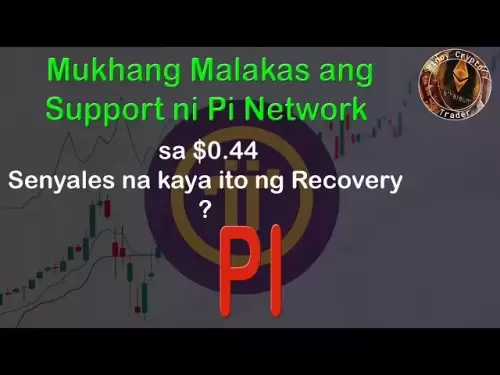 |
|
 |
|
 |
|
 |
|
 |
|
 |
|
 |
|
 |
|
 |
|
 |
|
 |
|
 |
|
 |
|
 |
|
 |
|
Cryptocurrency News Articles
Gold and Bitcoin Emerge as Safe Havens in a Dramatically Shifting Global Economic Environment
May 17, 2025 at 12:30 am
In 2025, entrepreneurs and investors are navigating a dramatically shifting global economic environment. The foundations of traditional finance, once trusted and stable, are showing deep cracks.

In 2025, entrepreneurs and investors are navigating a dramatically shifting global economic environment. The foundations of traditional finance, once trusted and stable, are showing deep cracks. Currencies are volatile, central banks are repositioning, and inflation remains a persistent concern.
Amid this uncertainty, two assets are emerging as go-to safe havens: gold and Bitcoin.
This isn't theoretical — it's a realignment backed by hard numbers, policy shifts, and investor behavior. Central banks are leading the charge into gold. According to the World Gold Council, these institutions purchased 290 tonnes of gold in Q1 2024, and the momentum has continued into 2025. China and Poland, in particular, have been rapidly increasing their reserves, signaling a decisive move away from reliance on the U.S. dollar.
Analysts attribute this shift to long-term geopolitical strategies and efforts to insulate national economies from sanctions and currency shocks.
Gold prices reflect this transformation. In April 2025, the metal reached a record high of $3,237 per ounce, according to GoldHub.
In China, the world's largest gold consumer, demand is outstripping supply, with reports of physical gold shortages at retail banks and dealers. Much of this gold demand is fueled by growing skepticism toward fiat currencies and government debt in a world of ongoing trade disputes and tariff wars.
But there's more to this story than just gold.
Related: Gold Prices Will Keep Soaring Over $4000 in 2026: JPMorgan
Bitcoin, often criticized for volatility and regulatory uncertainty, is evolving into a credible contender for the title of safe-haven asset. In April 2025, Bitcoin surged near $91,000, regaining confidence from investors and narrowing its year-to-date volatility. Now, it is trading north of $100,000.
Many institutions are re-evaluating their exposure, driven by Bitcoin's fixed supply, decentralized infrastructure, and rising status as an inflation hedge. Recent behavior in the markets suggests that Bitcoin is beginning to move in parallel with gold in response to macroeconomic shocks.
When the U.S. dollar depreciates significantly, capital flows out of stock markets are measured in trillions. Bitcoin and gold often rise simultaneously in these conditions, indicating that investors are starting to treat them as complementary safe-haven assets. This co-movement underscores Bitcoin's emerging role in the traditional investment landscape. As the global economy becomes more digital, this dual dynamic is only likely to strengthen.
The return of aggressive trade policies, especially those rooted in Trump-era tariffs and now being revived globally, has fueled further fears of prolonged inflation and supply chain instability. Investors are responding by retreating into assets not directly tied to fiat systems or geopolitical influence. This convergence of financial and political uncertainty is redefining what counts as "safe."
For entrepreneurs and startup founders, this shift has practical implications. Treasury management strategies, fundraising currency preferences, and cross-border financial planning must now all account for a world where traditional currency risk is higher and alternative stores of value are gaining credibility. Diversification is no longer just about balancing equity and debt — it's about hedging against systemic risks with assets that exist outside of traditional frameworks.
Related: Why Workforce Efficiency Isn't Just a Code for Layoffs
Yet, integrating these strategies isn't without challenges. Entrepreneurs must understand not just the assets, but the infrastructure around them. Gold requires secure custody solutions and often involves slower transaction speeds.
Bitcoin requires digital security expertise, regulatory awareness, and familiarity with wallets, private key management, and compliant exchanges. The decision to hold Bitcoin or gold isn't just about asset allocation — it's also about operational readiness and education.
Additionally, this paradigm shift affects how startups are valued, funded, and built. Investors increasingly ask founders how they plan to hedge treasury risk, particularly if their business operates across jurisdictions with volatile currencies. Accepting payments or fundraising in stablecoins or Bitcoin isn't viewed as fringe — it's pragmatic. Maintaining reserves in gold or crypto is becoming part of long-term capital preservation planning, especially for firms in emerging markets or sectors vulnerable to currency devaluation.
From a broader economic perspective, the rise of non-sovereign stores of value may signal the start of a more decentralized financial world. That doesn't mean fiat currencies are disappearing — but it does mean that reliance on them as the sole means of value storage is no longer assumed. Instead, trust is being redistributed: across borders, across systems, and increasingly, across code.
Gold provides historical continuity and geopolitical neutrality. Bitcoin provides technological resilience and digital mobility. Both have a place in the modern portfolio of any entrepreneur seeking to safeguard value in an unpredictable world. As more individuals and institutions adopt this dual approach, the financial infrastructure supporting these assets, from custody solutions to payment gateways, will only continue to mature.
Disclaimer:info@kdj.com
The information provided is not trading advice. kdj.com does not assume any responsibility for any investments made based on the information provided in this article. Cryptocurrencies are highly volatile and it is highly recommended that you invest with caution after thorough research!
If you believe that the content used on this website infringes your copyright, please contact us immediately (info@kdj.com) and we will delete it promptly.






























































